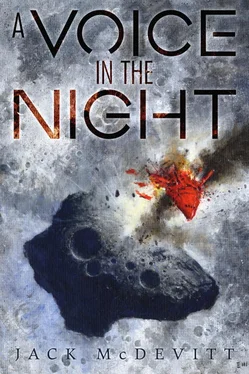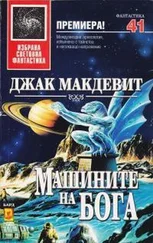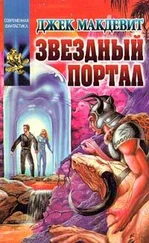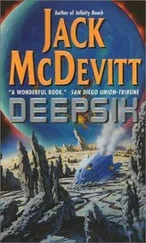Mike Kramer was holding two of the cans of paint his wife had bought. But he was lingering by the counter, showing signs of interest in the conversation. Arnold didn’t care. “Were you able to understand anything else?”
“I can tell you what it sounded like.”
“Like what sounded like?” asked Kramer. He was a big, serious man, his life entirely taken up by his wife and his truck. He was a hauler.
“It sounded like—.” Floyd dropped his voice, and delivered his next words in a conspiratorial tone: “—The Pack will be back.”
Arnold’s spirits sagged. “Excuse me, Floyd.” He turned away.
“The Pack will be back.” Floyd roared with laughter. “Sure enough, that’s what it said.”
“What what said?” demanded Kramer.
“Arnold says there’s an invisible thing out in the wind screen that predicts football scores.” Floyd’s grin was as wide as the Red River. “It sounds just like Arnold.”
Kramer laughed. When it was over, Arnold was left staring out across Bannister Avenue. His cheeks were red. He always thought of himself as an even-tempered man, and it was a fair assessment. On that day, however, he wondered where he might find a good hit man somewhere this side of Fargo.
At five o’clock, he closed up. And very deliberately ignored his jogging ritual. He changed into casual clothes, got into his car, drove out to the expressway, and turned north toward Canada. The wind screen, on his right, passed quickly and receded. When he reached the border, five miles north of Fort Moxie, it had become an insignificant green feature on the endless prairie.
He had dinner in Winnipeg and went to a movie. But he kept rerunning his conversations with the Traveler, things said and not said, and wondered what it made of his absence. Was it sorry for the way it had treated him? Did it care that he had not gone back?
The return ride was long and desolate, sixty-five miles through empty country, broken only by a couple of prairie towns. The night was clear, and a round, luminous moon lit the sky.
A sense of his own seclusion washed over him. And that seemed strange, because no one in town had more friends than he. People were always inviting him to their homes. And there had never been a Christmas during which he had eaten alone. Birthday cards flowed in like clockwork every year. On Saturday nights, he had the Elks. And he was a regular at Clint’s and the Prairie Schooner. Everybody in Fort Moxie knew and liked Arnold Whitaker. What more could anyone want?
Arnold, why do you travel relentlessly around the outer boundary of so lonely a place?
Why, indeed?
Next day, toward the end of the afternoon, Arnold went through his meagre library, and extracted two Civil War novels, Brice’s History of the Ancient World (which was left over from his single year at UND), and an anthology of mystery fiction. He wrapped them in a supermarket bag, went down the stairs into the store, and helped close out. They had a couple of late customers, Harry Sills, who was looking for a match for a three-eighths inch hex screw; and Walter Koss. Walter seldom bought anything, but he loved to browse through hardware.
It was consequently later than usual when Arnold changed into his jogging gear. He selected his favorite sweatsuit, white with red trim, an outfit in which he thought he looked particularly athletic. For the second time, he varied from his usual routine by leaving the car in the garage. He walked out onto Bannister and turned west, hauling his bag of books with him.
She was there. She was back on the center bench, the one directly in front of the temple. This time, he didn’t even notice whether anyone else was on the grounds: He saw no one but her. The worn brief case lay by her side. A book was open in her hands.
He walked casually along the concrete arc, ostensibly looking toward the Greek columns, but actually watching for some sign that she had noticed him. Her eyes never left the printed page.
He strolled to within a few feet of her. A wave of heat penetrated the cool afternoon air. She turned a page. He kept going, mounted the steps into the colonnade, and, with a sigh, went inside.
Jean DiLullo was on duty. Jean was always friendly in a detached sort of way. She wore narrow frame glasses over her dark eyes, and tended to speak with hushed authority, in the manner of a person who has a firm hold on Truth. Her world was intelligible, open to investigation, and well-organized within the bounds of the Dewey Decimal System.
Arnold set his package on the counter, while she finished checking out books to two adolescent boys. She smiled at him, and plied her stamp with energy. “Good to see you, Arnold,” she said.
Arnold nodded and returned the greeting. He took the books out of the bag. “I wanted to donate these.”
“Well, thank you.” She took a form from beneath the counter, wrote ‘FOUR HARDCOVERS’ on it, and pushed it across to him. “For the IRS,” she said. “You fill in the value.”
“Okay.” He asked how things were going, how her nephew Pete was making out at UND. Then, conversationally, “Who’s the woman out front? I know her from somewhere, but I can’t place her.”
Jean came around from behind the counter, walked to a window, and looked out. “That’s the new fourth grade teacher,” she said. “Her name’s Linda Something.”
“I’m sure I’ve seen her before,” said Arnold.
Jean smiled. “Why don’t you ask her?”
Nothing could have been further from Arnold’s mind. “Yes,” he said, casually, “maybe I’ll do that.”
He went back outside. Her red-gold hair glowed in the sunlight. She wore a white jacket over a blue blouse and skirt. As he watched, as he descended the stone steps, watching but not watching, she laid the book down in her lap, and her brow furrowed. Her eyes sought a spot off in the sky, and he felt that he could have stopped directly in front of her and not been seen.
He didn’t test the theory. He strode quickly by, giving no indication, he thought, that he had noticed her. A child with a balloon bumped into him, giggled, and ran off across the grass. Arnold broke into a trot as he regained Fifth Street, and a few minutes later he was literally fleeing up the slope toward the wind screen.
The signs of the Traveler’s presence appeared as soon as he entered the trees: warm drafts, unsynchronized movements of bushes and foliage, a gradual intensification of air pressure.
“Hello, Arnold.”
Arnold blew on his hands, and tried to look as if he’d come for the express purpose of running, and for no other reason. He increased his pace slightly. “Hello, Traveler.”
“I missed you yesterday.”
“I was tired. Took a break from the routine.” He kept jogging. “I’m not going too fast for you, am I?”
“No. It’s easier for me this way.” The elms and box elders shut off the sky. “I thought you might be angry.”
“Me? No. Why would I be angry?”
“We had a disagreement.”
Arnold’s sense of victory was not entirely unmixed with guilt. “I’m sorry,” he said. “I didn’t think my not being here would upset you.” He ran a little faster. “How long have you been alone? If you don’t mind my asking.”
“Since last winter.”
“Are you male?”
“The term does not apply. At least, not strictly.”
“What does that mean?”
“It’s complicated. Everything does not fit easily into your categories.”
“How do you reproduce?”
“You would need detailed instruction. Anyway, I’m not comfortable talking about it.”
Читать дальше










